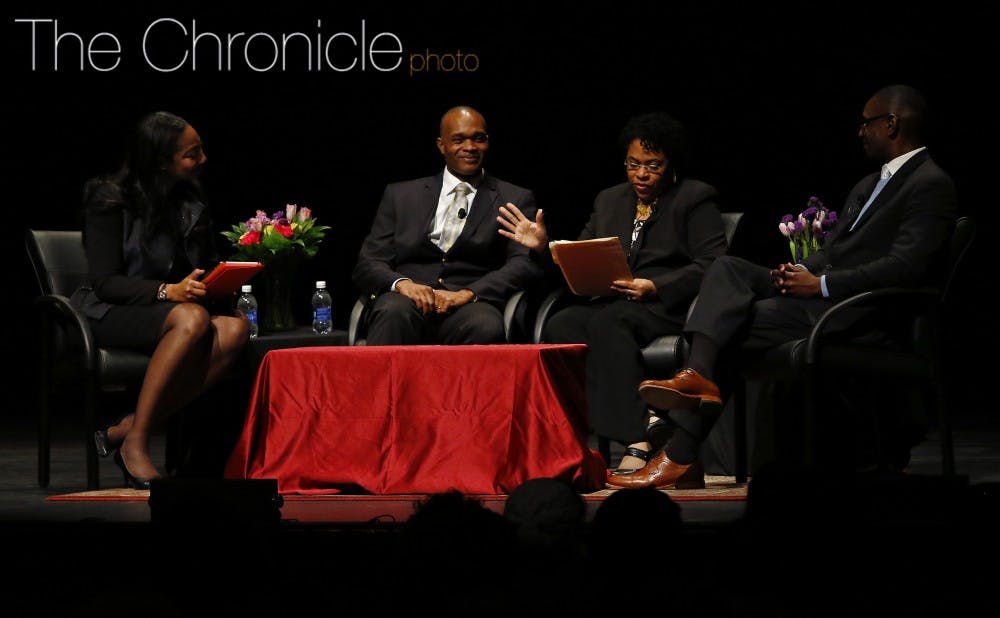Charleston shooting survivor Jennifer Pinckney and other panelists covered topics such as gun violence, human rights and the role of churches in the community in a wide-ranging discussion Tuesday evening.
Pinckney is the widow of the Rev. Clementa Pinckney, a pastor at Mother Emanuel African Methodist Episcopal Church and South Carolina state senator who was among the nine people killed in the June 17 church shooting. Pinckney was joined by two friends of her husband, the Rev. Chris Vaughn and the Rev. Kylon Middleton. The three panelists discussed the role of black churches such as Mother Emanuel, a black congregation described by Middleton as “the epicenter of African Methodism in the South.”
“The AME church itself was born out of a social justice protest,” said Middleton, a graduate of Duke’s Divinity School. “Mother Emanuel continues to stand tall as an example and a beacon of hope for reconciliation and peace in the world.”
The event—titled “Reflections on Charleston: A Conversation on Faith and Race”—was held in Page Auditorium as part of a series of discussions hosted by the Franklin Humanities Institute. Valerie Ashby, dean of the Trinity College of Arts and Sciences, delivered opening remarks and described her personal connection to Mother Emanuel, which she called “family.”
One theme of the evening was the responsibility of churches not only to their members, but also to their communities, especially on issues of racial and socioeconomic inequality.
“As the church, we cannot become an obsolete social club,” Middleton said. “We have a responsibility not to be mute on these subjects, but to stand up and make sure that the carriage of justice is fair and equitable.”
Vaughn agreed, cautioning churchgoers to avoid becoming complacent and to apply lessons learned through their faith toward solving problems in the community as Clementa Pinckney did.
His legacy continues today through the work of the Honorable Reverend Clementa C. Pinckney Foundation. One of the foundation’s goals is to raise money for a mobile health unit in rural areas of South Carolina, a project that the late senator had worked on, Jennifer Pinckney said.
“He was a voice for the voiceless,” she said. “He believed in public education. He believed in affordable healthcare.”
Eboni Marshall Turman, assistant research professor of theological ethics and black church studies in the Divinity School and the moderator of the discussion, asked the panelists about the issue of forgiveness. Shortly after the shooting occurred, several family members of the slain victims offered public statements of forgiveness toward the shooter.
Forgiveness should be given because God forgives, Middleton said. He added that it is equally important to “move on” and tackle other problems in society, including poverty, racial discrimination and gender disparities.
“I don’t really think it has anything to do with being black or white or whatever race,” Middleton said. “I think it has everything to do with being individuals who are centered with a moral, ethical compass. We ought not hold things that begin to divide, tear down and totally separate communities.”
The conversation also included a lengthy discussion of the debate over the Confederate flag that took place in the aftermath of the Charleston shooting. Although the peaceful removal of the flag from the South Carolina State House represented a victory, Middleton said there was still plenty of work to be done.
“We cannot begin to celebrate because a flag was removed where systems of hate and oppression still exist,” he explained.
Heightening political awareness among black communities is a crucial part of the solution, Vaughn said, noting that many state senators voted against removing the Confederate flag.
“We have to pay attention to what’s going on politically at all times,” Vaughn said. “We have to make sure that they have our best interests at heart. If they don’t have our best interests at heart, we have to exercise our right, and our right is to vote.”
The panelists also touched on the influence of divisive political rhetoric, an issue that has become especially prominent during the current election cycle.
“We have people running for president who say these degrading things about women and race and everything else,” Vaughn said. “The United States has a problem because we allow such things to go on.”
Get The Chronicle straight to your inbox
Signup for our weekly newsletter. Cancel at any time.

